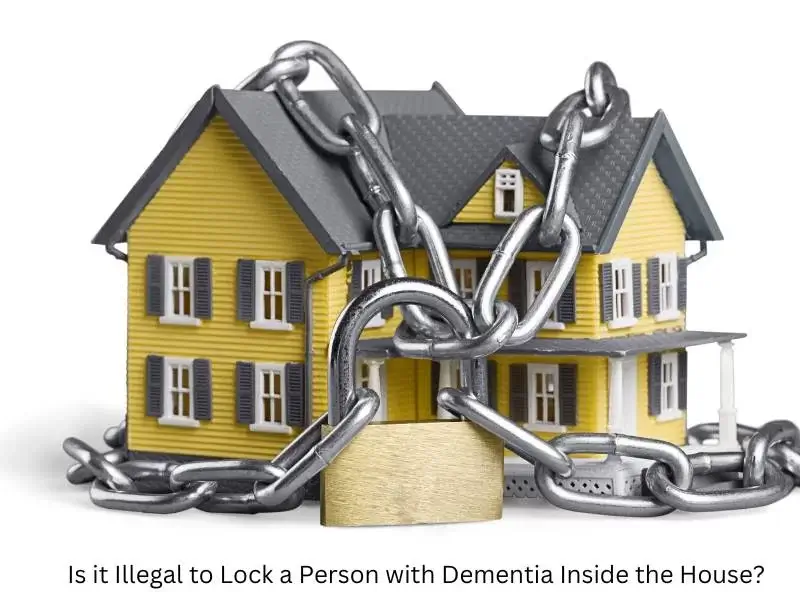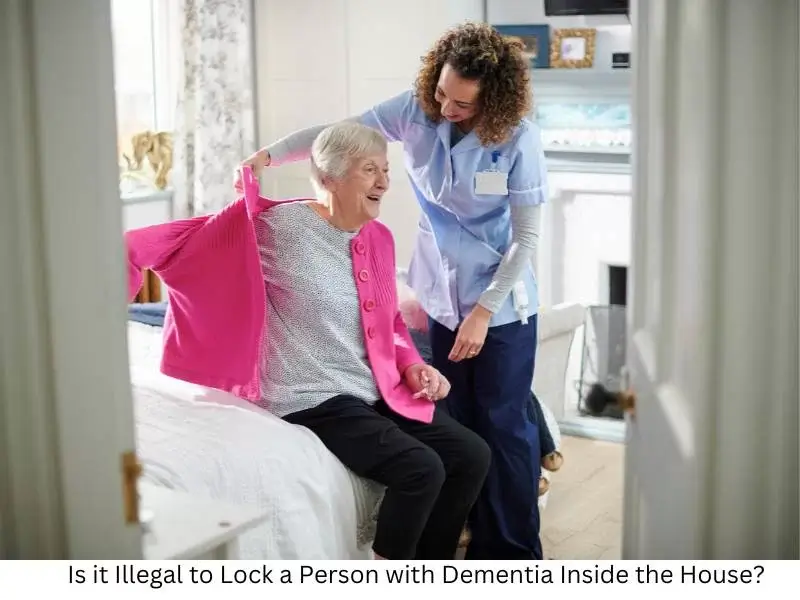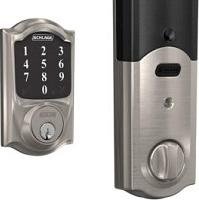You’re standing in the doorway, watching your loved one wander through the house. They have dementia, and their behavior can sometimes be unpredictable. You worry about their safety and wonder if locking them inside might be the best solution. But before you take any drastic measures, it’s essential to understand both the risks involved and the legal implications of such a decision.
Table of Contents
ToggleUnlocking the Mystery: Is it Illegal to Lock a Person with Dementia Inside the House?
In this blog post, we’ll delve into the complex world of dementia and explore whether it is illegal to lock a person with dementia inside their own home. We’ll also provide alternative strategies for keeping your loved one safe while respecting their autonomy. So let’s embark on this journey together, armed with knowledge and compassion!
Dementia and Its Effects on Behavior
Dementia is a progressive neurological disorder that affects millions of people worldwide. It is not a specific disease but an umbrella term for various conditions that cause cognitive decline. Alzheimer’s disease, vascular dementia, and Lewy body dementia are just a few examples.
One of the most challenging aspects of dementia is its impact on behavior. As the brain deteriorates, individuals with dementia may exhibit changes in personality, mood swings, agitation, and confusion. They may struggle with memory loss and have difficulty communicating effectively.
It’s crucial to recognize that these behavioral changes are not intentional or controllable by the person with dementia. They are manifestations of the underlying brain damage caused by the disease. Understanding their perspective can help us approach caregiving with empathy and patience.
7 Best Door Locks For Dementia Patient’s Safety
- 1. SCHLAGE FE575 PLY 626 ELA Plymouth Keypad
- (Overall, the Best)
- 2. MiLocks DF-02AQ (Electronic Door Locks for Dementia Patients)
- 3. Kwikset 99130-002 SmartCode 913 (Electronic door locks for dementia patients)
- 4. Safety 1st Outsmart Lever Handle Lock
- 5. Defender Security S 4180 Doorknob Lockout Device
- 6. White Door Guardian Safety Lock, 2-Pack
- 7. Kidde Carbon Monoxide Detector (Best Door Alarms for Dementia Patients)
Moreover, it’s important to note that each person’s experience with dementia is unique. While some individuals may become easily agitated or wander due to disorientation, others may display apathy or withdrawal from social interactions entirely.
As caregivers or family members supporting someone with dementia, it’s essential to educate ourselves about the condition so we can provide appropriate care tailored to their individual needs. By understanding how dementia affects behavior, we can foster a more supportive environment for our loved ones as they navigate this challenging journey.
The Risks of Locking a Person with Dementia Inside the House
Locking a person with dementia inside the house may seem like a solution to keep them safe, but it can pose severe risks to their well-being. One of the main concerns is that it restricts their freedom and independence, which can lead to increased agitation and frustration. This can escalate into challenging behaviors such as aggression or attempts to escape.

Moreover, being confined to one space for extended periods can have adverse effects on both physical and mental health. Lack of movement and sunlight can contribute to muscle weakness, decreased mobility, and even depression. Additionally, isolation from social interaction can further exacerbate feelings of loneliness and confusion.
In an emergency or medical situation, locking someone inside the house could delay access to necessary help. It may also prevent them from receiving proper care or treatment when needed.
Furthermore, locking someone with dementia indoors without proper supervision increases the risk of accidents or injuries. They might try to navigate unfamiliar settings alone or engage in unsafe behaviors due to boredom or frustration.
Caregivers and family members need to explore alternative solutions that prioritize safety while respecting the autonomy and dignity of individuals with dementia.
Related: Locks to Keep Alzheimer Patients from Wandering
Legal Ramifications of Locking a Person with Dementia Inside the House
When considering whether it is legal to lock a person with dementia inside their house, it is essential to understand the potential legal ramifications. While laws may vary depending on jurisdiction, there are generally significant concerns surrounding this issue.
First and foremost, locking someone with dementia inside their house can be considered a violation of their rights. Individuals have the right to freedom and autonomy, regardless of their cognitive abilities. Restricting someone’s movements without proper justification can infringe upon these fundamental rights.
Moreover, forcibly confining a person with dementia can potentially lead to charges of elder abuse or neglect. Caregivers have a responsibility to provide adequate care and support for individuals living with dementia. This includes ensuring they have access to necessary resources and maintaining their safety while respecting their dignity.
Additionally, some jurisdictions may have legislation prohibiting restraining or confining individuals against their will. These laws aim to protect vulnerable populations from mistreatment or harm.
Caregivers and family members alike must familiarize themselves with local laws regarding caring for people with dementia. Seeking professional advice from an attorney specializing in elder law can ensure compliance and avoid potential legal consequences.
Remember that every individual deserves respect, compassion, and protection under the law – including those living with dementia. It is essential to explore alternatives that prioritize safety while preserving dignity when caring for someone affected by this condition.
Alternatives to Locking Up a Person with Dementia
When caring for someone with dementia, it is natural to want to ensure their safety. However, locking them up inside the house may not be the best solution. Instead, consider these alternatives that can help maintain their freedom and dignity while keeping them safe.
1. Install security measures:
Implement door alarms or motion sensors that alert you when a person tries to leave the house. This way, you can monitor their movements without restricting them entirely.
2. Create a safe environment:
Make modifications in your home to reduce hazards and increase accessibility. Remove tripping hazards, install handrails in hallways and grab bars in bathrooms, and secure cabinets containing potentially dangerous items.
3. Establish a routine:
Individuals with dementia often thrive on structure and familiarity. Establishing a daily routine can provide comfort and minimize confusion or agitation.
4. Utilize technology:
Explore wearable devices such as GPS trackers or smartwatches that allow you to locate your loved one if they wander off.
5. Enlist support from others:
Seek assistance from trusted family members, friends, or neighbors who could periodically check on your loved one when you’re unavailable.
Remember, each person’s needs are unique; what works for one individual may not work for another. It’s crucial to continually assess the situation and adapt accordingly while promoting independence as much as possible.
Tips for Caring for a Loved One with Dementia
When it comes to caring for a loved one with dementia, it can be both challenging and rewarding. Here are some tips to help you navigate this journey:
1. Establish a routine:
Individuals with dementia thrive on consistency and structure. Create a daily routine with regular activities such as meals, exercise, and personal care.
2. Simplify the environment:
Reduce clutter and create an organized living space. Clear pathways, label drawers and cabinets, and use visual cues to help your loved one find their way around.
3. Practice effective communication:
Use simple language, speak slowly, maintain eye contact, and give your loved one time to process information. Avoid arguing or correcting them if they become confused or agitated.
4. Provide meaningful engagement:
Engage your loved one in activities they enjoy such as listening to music, looking at photo albums, or participating in gentle exercises like walking or stretching.
5. Ensure safety measures:
Install locks on doors leading outside to prevent wandering but avoid locking them inside the house without supervision due to potential legal ramifications (more on later).
6. Seek support from others:
Contact family members, friends, or support groups who understand what you’re going through. They can provide emotional support and practical advice.
7. Encourage self-care:
Remember that taking care of yourself is just as important as caring for your loved one with dementia.
Schedule breaks during the day where someone else can take over caregiving duties so you have time alone for relaxation or pursuing hobbies.
Remember, every person with dementia is unique; what works well for one individual may not work for another.
Therefore, it’s crucial to adapt these tips based on your situation while keeping love, respect, and patience at the forefront of your caregiving approach.
Resources for Help and Support
When caring for a loved one with dementia, it’s important to remember that you don’t have to face the challenges alone. There are numerous resources available to provide help and support throughout your journey.
One of the first places to turn is local support groups. These gatherings bring together individuals who are also caring for someone with dementia, allowing you to share experiences and gain valuable insight from others who understand what you’re going through. Support groups can provide emotional support, practical advice, and a sense of community.
In addition to in-person support groups, many organizations offer online forums where caregivers can connect virtually. These platforms allow you to ask questions, seek guidance, and receive encouragement from people worldwide.
Another valuable resource is educational materials. Books, websites, podcasts, and videos dedicated to dementia care can equip you with knowledge about the disease and strategies for managing symptoms and enhancing quality of life.
Professional assistance is also available through home health agencies or caregiver respite programs. These services provide trained professionals who can offer temporary relief by assisting with daily tasks or providing companionship for your loved one.
Don’t overlook government agencies such as Medicare or Medicaid, which may offer financial assistance or access to additional resources tailored to dementia care.
Remember that seeking help is not a sign of weakness; it’s an acknowledgment that caregiving can be challenging at times – especially when dealing with dementia. Utilize these resources to feel supported on this journey while providing the best possible care for your loved one.
Conclusion
It is essential to recognize that locking a person with dementia inside the house can have serious legal ramifications. While it may seem like a solution to keep them safe and prevent wandering, this approach can lead to isolation, increased anxiety, and even physical harm.
Instead of resorting to locking up a loved one with dementia, various alternatives can help ensure their safety while allowing them to maintain their dignity and independence. These include implementing home modifications such as installing locks out of sight or using technology like GPS tracking devices or door alarms. Creating a structured routine, providing engaging activities, and enlisting the help of support networks such as family members or professional caregivers can also be beneficial.
Caring for someone with dementia requires patience, understanding, and compassion. It is crucial to educate oneself about the condition and seek assistance from healthcare professionals specializing in dementia care. There are numerous resources available that offer guidance on managing challenging behaviors associated with dementia.
Remember that every person’s journey with dementia is unique, so what works for one individual may not work for another. It’s essential to tailor caregiving approaches based on the specific needs and preferences of your loved one.
By adopting alternative strategies instead of isolating individuals with dementia through locked doors or gates, we can promote their well-being while ensuring they receive proper care in an inclusive environment.
If you have concerns about caring for a loved one with dementia or need additional support navigating legal matters related to their care, don’t hesitate to seek professional advice from elder law attorneys specializing in these areas.
Together as a community, we can create an environment where individuals living with dementia are treated respectfully and provided the necessary support they need during each stage of their journey.
Read more: How to Keep Dementia Patients from Wandering.








